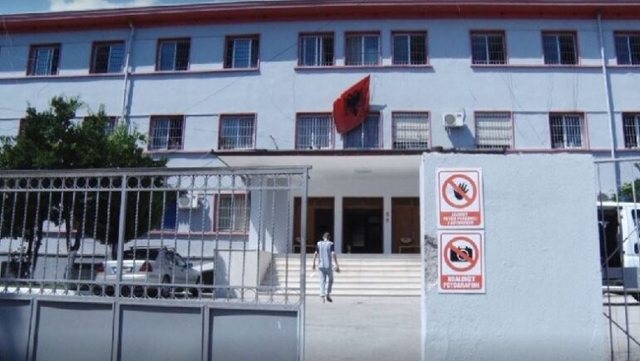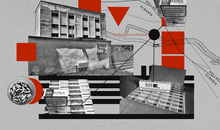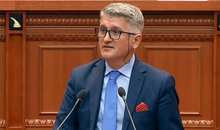
 Flash News
Flash News
Accident on the Krahes-Memaliaj axis, a 65-year-old man is injured
The Ministry of Agriculture confirms 4 outbreaks of cattle plague in different areas of Albania
Suffering cardiac arrest, vacationer dies on Qerret beach
Alarm on the coast/ Elderly woman from Kosovo risks drowning!
Shot in the head, former Albanian policeman dies after 3 days
The Ombudsman's report on the state of psychiatric hospitals in Albania: Inadequate infrastructure

In the latest inspection report on psychiatric hospitals in Albania, published by the Ombudsman, a series of important issues have been identified that affect the quality of treatment and the conditions of people with mental health problems.
From inadequate infrastructure, to overcapacity and untrained staff, the problems highlight the need for a larger budget for these institutions. According to data obtained, during 2023, there were 3,161 patients in the 4 psychiatric hospitals in the country.
The report emphasizes that many of the recommendations have been repeated over the years and often do not require a large budget for their implementation, but remain unresolved. The Ombudsman has requested that these measures be taken into account as soon as possible to ensure a more qualitative, humane and dignified treatment for people with mental health problems in Albania.
Inspections were carried out in several institutions, including psychiatric hospitals in Vlora, Shkodër, Elbasan, Tirana, as well as in special institutions for prisoners in Lezha and Tirana.
Main Issues:
• Inadequate infrastructural conditions: Psychiatric hospitals in Vlora, Elbasan, Shkodër and Tirana continue to face significant deficiencies in structural conditions for the treatment and recovery of patients.
• Lack of recovery activities: In some institutions, such as the “Xhavit Gjata” hospital in Tirana and “Sadik Dinçi” in Elbasan, there is a lack of facilities for the development of occupational skills and recovery activities.
• Insufficient capacities: Psychiatric health institutions suffer from a lack of space to accommodate patients in recovery phases, such as in the hostel system in Shën Koll.
• Lack of investment: The reconstruction of wards, especially in Elbasan hospitals and the QSUT, remains an immediate need to meet the standards required by international institutions.
• Insufficient and untrained staff: There is an urgent need for additional psychiatrists, nurses, and support staff, as well as for special training in the management of patients with severe mental disorders.
• Lack of special wards: Patients abusing narcotic substances do not have spaces dedicated to specific treatment.
The Ombudsman has proposed a series of measures to improve the situation, including:
• Complete reconstruction of hospital buildings and improvement of infrastructure conditions (heating, showers, toilets).
• Equipping hospitals with mechanical restraint devices and reorganizing wards for acute patients.
• Installing camera monitoring systems in common areas to increase security.
• Creation of special wards for people with disorders related to substance abuse.
• Increasing quotas for psychiatry specialists and increasing clinical and support staff. /Monitor/
Latest news




Demand a recount of votes in Tirana, the Court dismisses Alimehmet's case
2025-06-12 12:22:08
Suffering cardiac arrest, vacationer dies on Qerret beach
2025-06-12 12:05:48

The market is "demanding" a minimum wage increase
2025-06-12 11:52:37

Alarm on the coast/ Elderly woman from Kosovo risks drowning!
2025-06-12 11:25:51
The hearing for "Golden Bullet" is postponed due to the lack of lawyers.
2025-06-12 11:06:27
The Special Court schedules the hearing for the “Partizani” case
2025-06-12 11:00:42
"We work to steal"/ Berisha releases Rama's video: The first time he is honest!
2025-06-12 10:52:11


US limits non-essential staff at embassy in Iraq after rising tensions with Iran
2025-06-12 10:19:44

Hero in Greece/ Albanian immigrant saves two children from drowning in river
2025-06-12 09:52:46
Albanian Customs Officials Crack Down on Cigarette Smuggling Business
2025-06-12 09:37:17

26 years of freedom! Kosovo marks Liberation Day today
2025-06-12 09:14:19
Clear skies across the country, weather forecast for today
2025-06-12 09:03:08
The level of salaries in construction and tourism remains below average
2025-06-12 08:49:54


Murder in Xibar i Klos/ Hazbi Velsula, the victim's cousin, in custody
2025-06-12 08:23:45
Morning Post/ In 2 lines: What mattered yesterday in Albania
2025-06-12 08:09:51

Bylykbashi: The EPP Assembly adopted the strongest resolution in this forum
2025-06-11 22:46:15
A person is found dead in Klos, suspected of being murdered
2025-06-11 22:33:38


Rape the cleaning worker in Athens, the Greek police declare the Albanian wanted
2025-06-11 21:30:13
Disappointment with Latvia, Elseid Hysaj reacts after disappointing transfer
2025-06-11 21:15:08

EU: New package of sanctions against Russia focuses on energy and finance
2025-06-11 20:51:17

Scandal in Lezhë/ The apartment is covered by sewage
2025-06-11 20:37:59
Rural schools left behind in the use of digital tools
2025-06-11 20:09:51
Kosovo bans import of sheep and goats from Albania
2025-06-11 20:01:17
Shot in the head, former Albanian policeman dies after 3 days
2025-06-11 19:41:08


Weather-shaping factors: How cloud-dwelling microbes affect our lives
2025-06-11 19:01:22



Immigration policies/ Famous TikToker leaves the US
2025-06-11 18:20:30







Renowned QSUT doctor passes away
2025-06-11 17:03:30
Photo/ Van catches fire on the Fier-Lushnje highway
2025-06-11 16:54:35
Kurti confirms agreement with US on immigrants: We will accommodate 50 people
2025-06-11 16:42:50
Poll/ Do you believe that the vote recount will change the result of May 11?
2025-06-11 16:31:21
Martin Can's murder, 6 people testify in closed-door session
2025-06-11 16:28:14
The silent tragedy! 56 suicides have been recorded in the country since January
2025-06-11 16:20:06
First case of monkeypox identified in Albania
2025-06-11 16:13:18


Ukraine repatriates bodies of soldiers killed by Russia
2025-06-11 15:37:13



Menopause, tips for a healthier transition
2025-06-11 15:03:00
A person was violently robbed, a serial thief was arrested in Durrës
2025-06-11 14:48:43

Tensions with Russia return, Poland arrests 28-year-old for spying for Moscow
2025-06-11 14:33:58
Foreign tourist dies in Saranda, initial suspicions
2025-06-11 14:14:38
A person was injured with a knife in Kuçova, the 26-year-old was arrested
2025-06-11 14:08:51
Nuclear tensions rise as Iran and US disagree on date for talks
2025-06-11 14:00:32

'Sterilization' trial postponed, here's when the next hearing will be held
2025-06-11 13:44:18
Greece considers banning burqa in universities
2025-06-11 13:36:04

Curvy roads and looking at your phone make you nauseous? Find out why
2025-06-11 13:20:18


List/ What are the teams qualified so far for the 2026 World Cup?
2025-06-11 12:54:56


OVERDOSE
2025-06-11 12:38:27
Kosovo government rejects US request to shelter immigrants from third countries
2025-06-11 12:32:01

By-elections in 3 municipalities remain in Rama's hands, despite the law
2025-06-11 12:12:33

The attempt to constitute the Kosovo Assembly fails for the 30th time
2025-06-11 11:57:14


Former Rector of the University of Tirana, Dhori Kule appears in SPAK
2025-06-11 11:35:07
Missing for six days, 20-year-old man found dead in Korça (NAME)
2025-06-11 11:28:27
6-year-old boy found dead on the banks of the Shkumbin River
2025-06-11 11:20:20

Shooting in "Ali Dem", 26-year-old injured, 4 wanted
2025-06-11 11:00:41

"X" with Latvia sparks debate, Sylvinho's dismissal is demanded
2025-06-11 10:41:31
